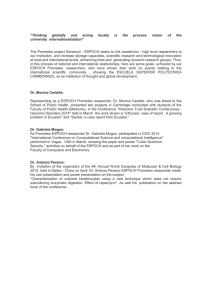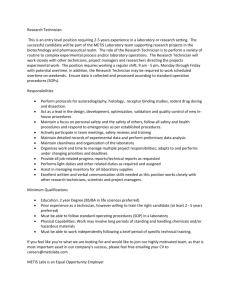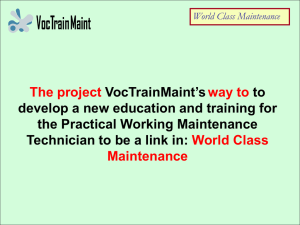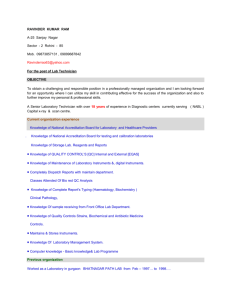conclusions (the italian case study) - ADAM
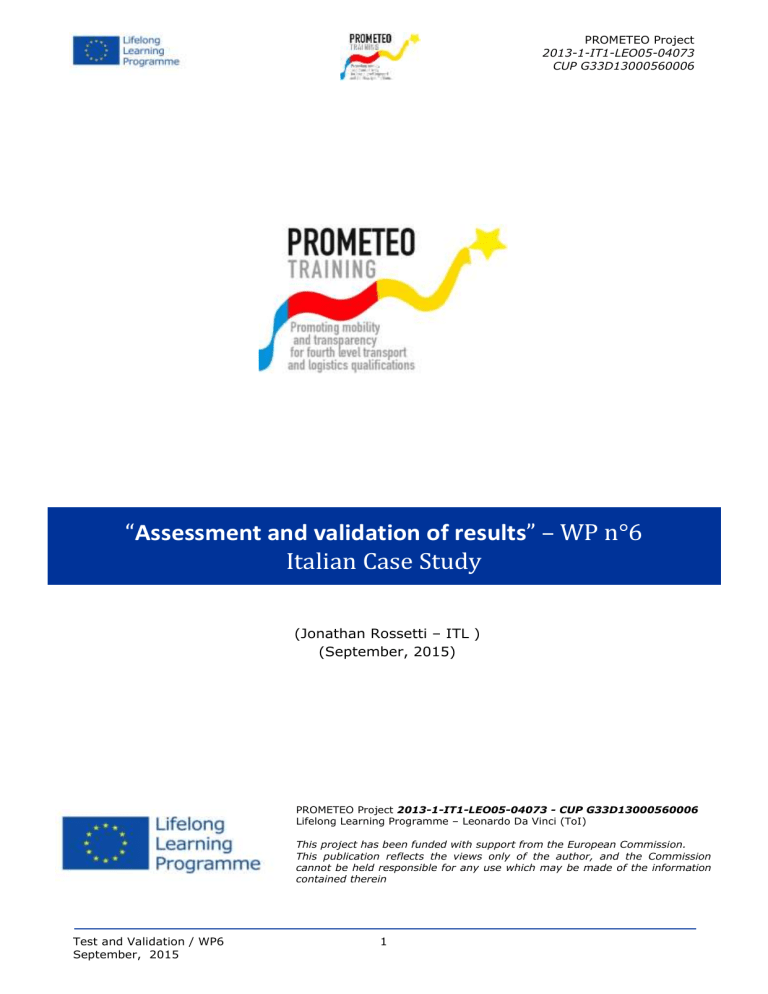
PROMETEO Project
2013-1-IT1-LEO05-04073
CUP G33D13000560006
“ Assessment and validation of results ” – WP n°6
Italian Case Study
(Jonathan Rossetti – ITL )
(September, 2015)
PROMETEO Project 2013-1-IT1-LEO05-04073 - CUP G33D13000560006
Lifelong Learning Programme – Leonardo Da Vinci (ToI)
This project has been funded with support from the European Commission.
This publication reflects the views only of the author, and the Commission cannot be held responsible for any use which may be made of the information contained therein
Test and Validation / WP6
September, 2015
1
PROMETEO Project
2013-1-IT1-LEO05-04073
CUP G33D13000560006
Assessment and Validation of the Training Program
Italian Case Study: Technician for Warehousing and Transport
N° Interviewed Stakeholders: 10
Stakeholder Categories: Directors Technican and Vocational Institutes, Training Experts, Training Providers,
Public Decision Makers (Director – Ministry’s Local Offices), Companies’ technicians, University Professors,
Training Managers, Directors Higher Technical Institutes
Questions/Statements to be assessed:
1.
All the topics covered in the Training Program are relevant.
2.
The training program provides the essentials skill for this job. What are the missing skills? What, if any, specific topics should be added to the training program?
3.
There is an ideal balance between theory / practice and internship.
4.
The duration of the training is relevant.
5.
The relevance (weight) of the LOs Units is appropriate.
6.
The Technician for warehousing and transport (4EQF) and the Higher Technician for info-mobility
(5EQF) are job profiles coherent in terms of working processes.
7.
The EQF level n°4 is appropriate for the Logistic Assistant .
8.
What are the strengths of the training program?
9.
What are the weak points of the training program?
10.
Which changes would you like to recommend in terms of training content?
11.
The qualification (4 th EQF) is coherent to the national and EU standards for training.
12.
In order to use the project results at national level, what changes should be necessary?
Test and Validation / WP6
September, 2015
2
PROMETEO Project
2013-1-IT1-LEO05-04073
CUP G33D13000560006
Table for Collection of DATA & INFO related to Assessment and Validation process
Italian Case Study: Technician for warehousing and transport
QUESTION n°1
Comments :
QUESTION n°2
Missing skills : topics to be added to the training program?
QUESTION n°3
Strongly Agree
6
Agree
1
DON’T KNOW*
2
Disagree
0
Strongly Disagree
0
The main “technical” aspects that are fundamental for a Technician (both “classic”
4EQF, both Upper 5EQF) are present and relevant in both the qualifications:
Warehousing, Transport organization, Positioning within the SC, ICT tools and solutions, and Sustainability, that is one of the main aspect related to the Training in
ITS Piacenza. The ITS Piacenza is indeed included in the Sustainable Mobility Area, this means that some specific issues concerning environmental protection, energy use, environmental friendly solutions for Transport.
5 1 3
No missing skills
0 0
No topics to be added
Comments :
QUESTION n°4
Comments :
QUESTION n°5
QUESTION n°6
Comments :
QUESTION n°7
QUESTION n°8
5 2 2 0 0
The Balance is good and it goes in the direction of the new reform of Education in
Italy. The reform “La Buona Scuola” will introduce procedures similar to those of the
German Dual System, with a great involvement of companies and with a number of hours dedicated to the training on-the-job that is clearly higher than in the past.
6 1 2 0 0
Yes, it is coherent with the national standard for Technicians in Transport & Logistics
4
8
3
1
2
0
0
0
0
0
The two qualifications are absolutely coherent in terms of competences, the main
“technical” aspects that are fundamental for a Technician (both “classic” 4EQF, both
Upper 5EQF) are present and relevant in both the qualifications. Correctly, some aspects more related to the management of the business, of logistics, of large working team are not considered as the technician of the 4 th level is a medium skilled position.
8 1 0 0 0
The course is innovative and would be launch in the context of the new reform “La
Buona Scuola”. It involves companies, and it would be a “pilot” experience in Italy.
The main job has already been performed within the Prometeo Project, indeed the
Training Program have been almost already defined and is coherent with those related to the ITS of Piacenza, that is settled exactly within the ISII Marconi building.
Moreover, it has to be taken in consideration that many schools haven’t the competence for defining a similar training course, therefore they need the support of experts and consultant, but thanks to PROMETEO this “job” has been already done.
Test and Validation / WP6
September, 2015
3
PROMETEO Project
2013-1-IT1-LEO05-04073
CUP G33D13000560006
QUESTION n°9
QUESTION n°10
QUESTION n°11
QUESTION n°12
Test and Validation / WP6
September, 2015
The weak point is not related to the Training Programme, but on “cultural” problem that is quite spread in Italy. The problem has its origin in a not efficient and appropriate organization of communications and guidance activities.
Generally, in the primary cycle of education, the Guidance (for choosing the
Secondary school, 4EQF) is implemented by teacher and professors specialized in
“Human” subjects (literature, history…) and have not a clear and complete view of many industrial sectors and of the activities of companies. It’s therefore necessary an alternative way of communication, able to transfer to families another point of view than only the one of the professor of Literature.
Guidance activities implemented by Secondary Schools suffer of some deficit:
Schools have a “low” credibility because they are directly promoting their own courses, therefore in the view of families they’re clearly enhancing positive aspects, instead of criticalities.
Schools promote a training that is preparatory for the job, but since they are schools they are not included in the industrial sector, are not companies, therefore they have to support activities that are not under their direct control
The manufacturing and production system must be involved in the School System and has to support the promotion the same systems. Companies must be the main players of “Guidance” activities. They need to underline to positive aspects of the job, the training needs requested and missing, the need of new workers for the sector.
Benefits must be very clear. All these aspects cannot be “transferred” by professors and teachers of the Primary Schools. All the most important and typical professions for the sector should be shown and introduced to students and families, the availability of job positions should be highlighted, because in many situation the decision-makers (mainly parents) are totally not aware of the sector and its operations, trends and strategies.
One innovative communication tool might be a short but attractive documentary
(movie) in which for example some companies’ best practices and interesting operations/tools are shown, experiences of workers and trainees, needs of the companies (job positions of not low level), availability of different professional careers. Also company visits should be considered and organized as conferences and target workshops.
No changes are recommended
5 3 1 0 0
The PROMETEO results are more or less ready to be applied in the Italian System of
Training. Schools have a good perception of the educational and competence standard defined for the Technician for Warehousing and Transport (Italian Case
Study). Few last verifications will be necessary in the future, at the moment of the concrete implementation of the course:
It is necessary to check the coherency of PROMETEO’s Learning Outcomes and the
LOs of the standard professional profile. Since ITL has already made an internal verification of the matching between the two competence profiles, it will be
4
PROMETEO Project
2013-1-IT1-LEO05-04073
CUP G33D13000560006 necessary only to prepare a specific document explaining and proving the matching between competence standards.
Moreover once the Reform “La Buona Scuola” will be operative and the directives will be defined, it will be probably necessary to “check” specific aspects concerning the duration of internship and practical activities. So far, the proportion seems to be correct and in line with the Reform.
* DON’T KNOW: experts that have not expressed any opinion because out of their competences
Test and Validation / WP6
September, 2015
5
PROMETEO Project
2013-1-IT1-LEO05-04073
CUP G33D13000560006
CONCLUSIONS (THE ITALIAN CASE STUDY)
According to the results of the “Assessment and Validation” activities of PROMETEO, the project products find their ideal placement in the local context of the province of Piacenza. As the project progressed it became evident that there is a lack of Technical Vocational education relating to Logistics in the Province
(that has a strong logistics vocation) as well as throughout Italy itself. This deficiency is a common problem and can be summed up as a ‘disconnect’ between the world of education and the world of work. In part this is due to the poor reputation Vocational education has, particularly with some sectors and professions; this perception has now permeated into popular culture and has become a cultural and social dilemma as well as an educational one. Despite significant progress to alleviate this view, the perception still exists to some extent. However, this does present a significant opportunity as it enables new discussions and investigations to take place alongside the creation of new solutions to take account of and challenge strategic and operational perspectives.
The development of the project has involved a large number of stakeholders who have been able to analyse and respond to the data, and arrive at a common and shared solution. The Final Conference of the
PROMETEO project stipulates the development of a partnership that brings together the local Technical
Institutes, the Regional Office of Parma and Piacenza, the Emilia Romagna region, the Municipality of
Piacenza, the Institute for Transport and Logistics and other stakeholders. The ultimate goal of the partnership is to launch, in one of the Technical Institutes of the Province of Piacenza, a course for
Technicians (Perito) for Transport and Logistics that has the educational and competence standards developed by the PROMETEO project and not available at the moment in Piacenza’s Technical schools.
Further, in the wake of the upcoming ‘inauguration’ of the reformed ‘la Buona Scuola’ (2015), it would appear there is an intention to introduce a system that gains greater ‘buy-in’ from companies to provide the students and families of communication, guidance and training in a similar fashion to that of the
‘German Dual System’. The Institute of Transport and Logistics will promote and co-ordinate collaboration amongst stakeholders for the development and implementation of these strategies.
Moreover, the Berenini Technical Institute of Fidenza is already taking into account the educational standards elaborated by PROMETEO in order to support teachers in the implementation of the Training
Programme. A document certifying the utilization of PROMETEO results will be presented together with this report.
Finally, according to interviewed experts the Competence Standard of the linked qualifications (Training
Stairway) are coherent and well structured. The new 4 th EQF level qualification so identified, the Technician
for Warehousing and Transport, does not include ‘Upper Skills’ such as the management of a large workforce, developing company strategies and the planning and governance of transport and logistics frameworks (EQF level 5). Instead, the new qualification take into account the operational management of the supply chain, flows of information related to goods, the warehouse’s policies and procedures in relation to the handling and storage of goods, related flows of information, transport legislation, the use of ICT and the documentation required for transporting goods throughout Italy and overseas. The concept of
‘Sustainability’ underpins the whole programme, as a key issue for ITS in relation to sustainable Mobility. In conclusion, the definition of a bond of coherence between the two mentioned qualifications guarantees
"continuity" in the training and professional path of student and aims to simplify the acquisition of skills increasingly specialized and qualifying.
Test and Validation / WP6
September, 2015
6
